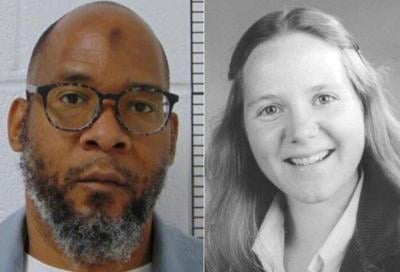ST. LOUIS COUNTY — Attorneys sparred Wednesday morning in court while questioning experts and a lawyer about decades-old evidence used to convict a man of murder and sentence him to death.
The hearing is the latest in Marcellus Williams’ effort to prove that he is innocent of Lisha Gayle’s 1998 killing, a brutal stabbing he’ll be executed for in less than four weeks if Judge Bruce Hilton does not rule to vacate his conviction.
St. Louis County prosecutors, whose office sought his conviction in 2001, now say he’s innocent and have worked with William’s lawyers to ask the court to vacate his conviction.
The Missouri Attorney General disagrees and remains adamant that the evidence proves he’s guilty.
Wednesday’s hearing was littered with objections during testimony, mostly made by lawyers representing Missouri Attorney General Andrew Bailey.
People are also reading…
“I can’t even finish my question without an objection,” Matthew Jacober, special counsel for the prosecutor’s office, said during his questioning of a DNA expert.
The attorneys were there to argue the facts of a case whose evidence does not clearly point to either guilt or innocence:
The DNA has been compromised, bloody fingerprints destroyed, and two main witnesses in the original trial had questionable motives — and are now dead.
During one witness questioning, the attorney general’s office objected and said the bloody fingerprints cited by prosecutors and Williams’ attorney were smudges left by a gloved hand.
Still, Williams' team maintains there is no physical evidence linking him to the crime.
The hearing comes a week after Williams made a surprise deal with the office of St. Louis County Prosecutor Wesley Bell to plead no contest to the murder charge against him. Williams, who continues to maintain his innocence, agreed to the deal in exchange for life in prison without the possibility of parole.
This agreement came last week after DNA testing showed the DNA samples on the murder weapon were consistent with the case’s original prosecutor and investigator.
Hilton, the judge, allotted six hours for the hearing, giving two hours for each the prosecutor’s office, Williams’ defense team and the attorney general’s office to present their cases.
Before openings, attorneys confirmed that there were about 12,000 pages of evidence submitted to the court.
Williams appeared in court Wednesday donning what he wore last week: black-rimmed eyeglasses, a white Taqiyah — a cap for Muslim men — and a light grey thobe, a long robe Muslim men often wear.
He remained stoic and appeared focused throughout the morning’s testimonies.
In his opening argument, attorney Michael Spillane argued for the attorney general’s office that the only claim that should be debated is Williams’ claim filed this week of bad faith destruction of evidence in light of the new DNA evidence.
“Every claim they have made except the new one has been rejected by the Missouri Supreme Court,” Spillane said.
Williams’ case has worked through a lengthy appeals process for years now.
He said the former prosecutor and lead investigator, Keith Larner and Ed MaGee respectively, “had no idea what touch DNA” was at the time of the 2001 trial, meaning there was no bad faith in their possible handling of the murder knife.
“Mr. Larner and Mr. Magee did absolutely nothing wrong and it’s not a nice thing to say they did when there is no evidence they did,” Spillane said. “I don’t like (Larner) accused of sloppy evidence practices,” Spillane said.
He also said the destruction of bloody fingerprints before the trial — which later his office argued were actually smudges from a glove — was normal and accepted practice because they were “unusable.”
Matthew Jacober, special counsel for the St. Louis County prosecuting attorney’s office, declined to make an opening statement. His team instead called their first witness.
Dave Thompson appeared via Webex and said he was a certified forensic interviewer working at Wicklander-Zulawski & Associate, a company that provides training in forensic interviewing.
He said the case’s two pivotal witnesses, Henry Cole and Laura Asaro, provided unreliable testimony because most of the information they provided had either already been reported by news media or was information police knew.
The exception, he said, was Asaro’s information regarding where Gayle's husband's stolen Apple laptop was.
“In my opinion, in what I reviewed in Mr. Cole’s deposition, in his statement he was very persistent in obtaining a financial reward,” Thompson said. “The immediacy of needing such incentive creates a desperation in providing information. We (also) see this in false confession research.”
Andrew Clarke, an attorney for the attorney general, pointed out in his cross examination that Thompson did not interview any police officers who conducted those interviews, had reviewed less than 1,000 pages of the case’s 12,000 pages of evidence and was being paid by the Innocence Project for his consulting.
Jacober then called Judge Joseph Green, who was a private attorney contracted by the public defender’s office to represent Williams in his 2001 first-degree murder trial.
Green testified that in his career he had tried about 25 capital murder cases and during the month before Williams' trial the lawyer represented another capital murder suspect, Kenneth Baumruk.
Baumruk was convicted in 2001 of murdering his wife in 1992 at the St. Louis County courthouse.
“No matter what I did, some aspect of either case was going to suffer because of the timing,” Green said, adding that he believed William’s case did suffer. “I don’t believe he got our best.”
He also testified that he did not have all of the evidence, including Department of Corrections records about Williams, used by the state to argue for execution in the penalty stage of Williams' trial.
Jacober then called Dr. Charlotte Word, who has a PhD in microbiology, and works as a consultant and took the stand after Green. In Bell’s January motion, word was the third DNA expert to review the knife’s sample and ruled out Williams as a match.
She also is paid by the Innocence Project for her consultation, she said.
After a lengthy questioning establishing her qualifications and best DNA handling practices, Word addressed the DNA on the kitchen knife used to kill Gayle.
“For the DNA that was recovered, it is not his DNA,” she said “No DNA recovered and tested includes him as a possible source. He is excluded as either of the two sources.”
She then said she didn’t know if his DNA was ever on the knife because of the possibility of contamination given the prosecutor's DNA on the knife.
On cross examination, Word explained that scientists can only ever know the minimum number of different DNA profiles in a sample — there may be more if the profiles are similar enough.
But she maintained there were two samples identified on the kitchen knife.
Before lunch, St. Louis Judge Christopher McGraugh briefly took the stand. He worked on Williams’ defense team in 2001.
He testified that no one touched the murder weapon outside its evidence bag during trial. McGraugh also said he was never told by prosecutors that they or investigators had handled the knife directly.
Nimrod Chapel, president of Missouri NAACP, speaks to reporters outside the courthouse in Clayton about a deal prosecutors reached with Marcellus “Khaliifah” Williams that changes Williams death sentence to life in prison without the possibility of parole on Wednesday, Aug. 21, 2024. The change in sentencing came about five weeks before Williams' scheduled execution date for the murder of Lisha Gayle, who was stabbed 43 times in her suburban home in August 1998. He was convicted of the killing in a 2001 trial.











